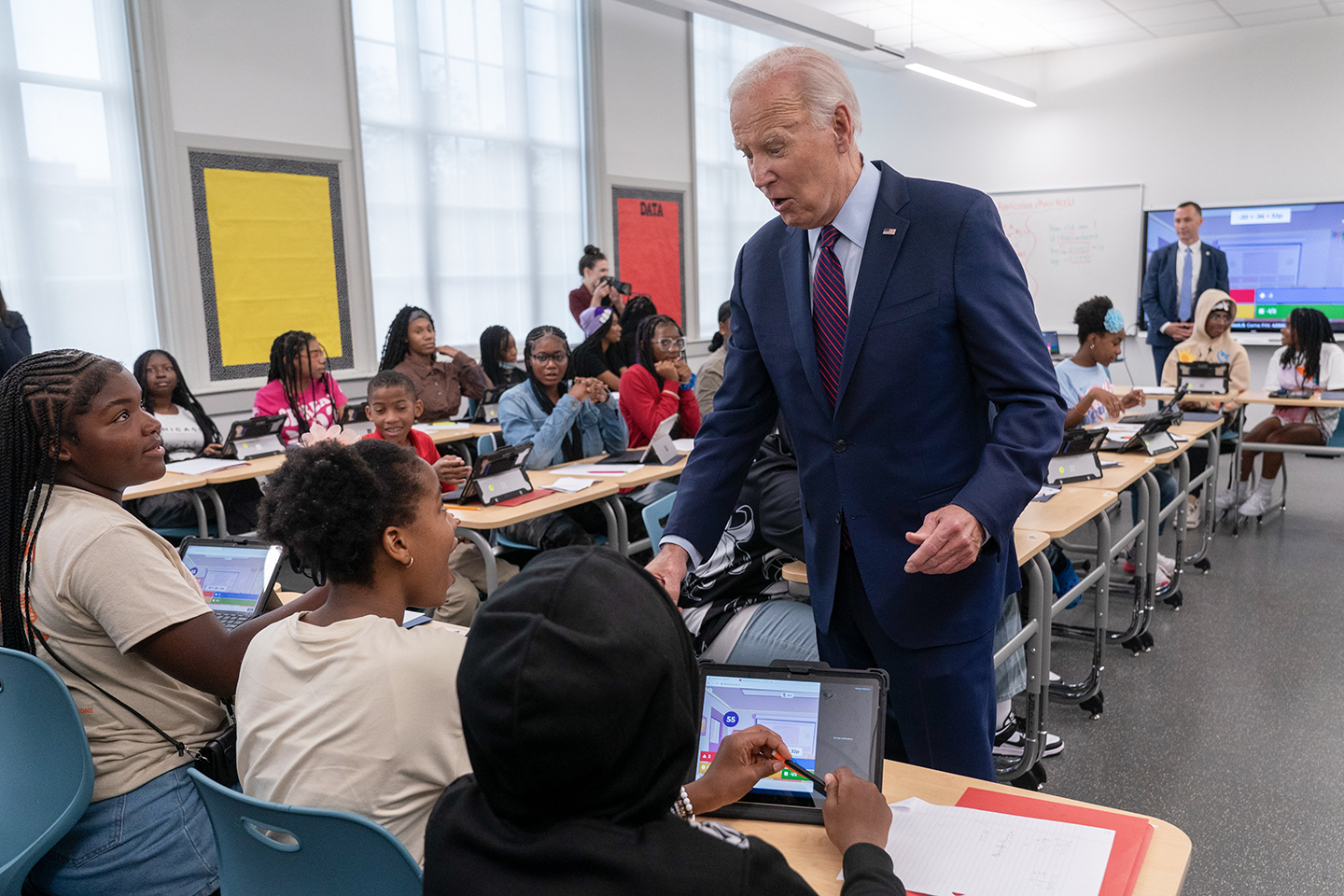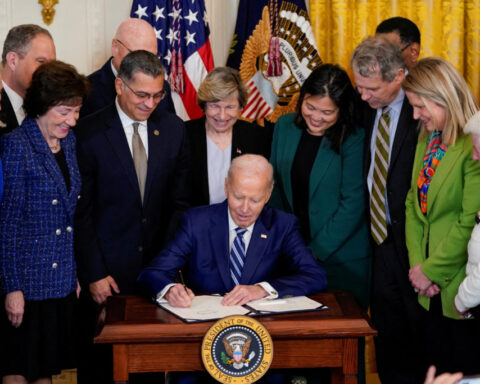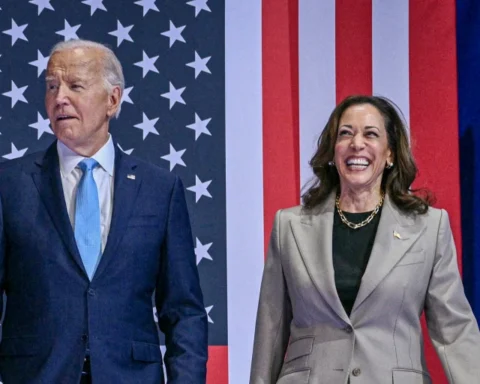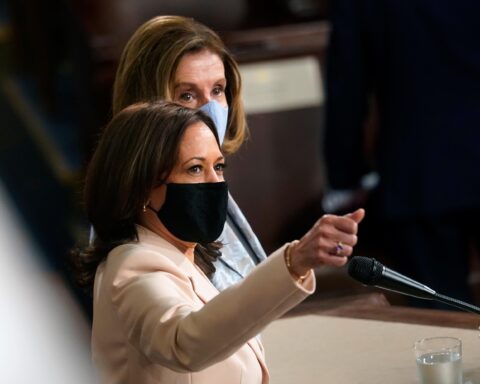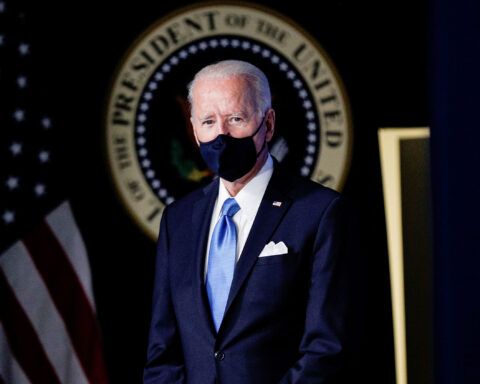By Katherine Knott
President Biden will not seek re-election, he announced Sunday. The news capped weeks of debate about his ability to defeat former president Donald Trump, the Republican nominee, and spelled the imminent end of a White House tenure that has been filled with ambitious plans to forgive student loans and make higher education work better for students.
“It has been the greatest honor of my life to serve as your President,” Biden wrote in a letter posted on social media. “And while it has been my intention to seek reelection, I believe it is in the best interest of my party and the country for me to stand down and to focus solely on fulfilling my duties as President for the remainder of my term.”
Biden wrote that he’ll speak to the nation later this week about his decision. In a subsequent post on social media, he endorsed Vice President Kamala Harris to be the Democratic presidential nominee.
The story of Biden’s higher ed legacy is not yet finished. A number of changes are still in the works as he heads into the final six months of his presidency—including a sweeping plan to forgive student loans for nearly 28 million Americans—and legal challenges could block some of Biden’s most significant initiatives. But the president and his administration have worked to roll back rules and regulations put in place during the Trump administration, overhauled student loan programs—making it easier for millions of borrowers to access relief—and stepped up scrutiny of programs that don’t pay off for graduates.
“I think his legacy will be one as a strong education president,” said Michelle Dimino, director of the education program at Third Way, a left-of-center think tank. “Nobody can say that President Biden hasn’t been a student-centered education reform proponent.”
As a candidate, Biden pledged to make community college free, double the Pell Grant and forgive $10,000 in student loans for borrowers, among other promises. Many of those promises remain unfulfilled, thwarted by Congress or the courts.
More than any prior president, Biden has sought to use executive power to forgive student loans—a policy stance that gained support among Democratic lawmakers following a decade-long campaign by scholars, borrowers and advocates to highlight the problem of student loan debt. So far, his administration has forgiven $168.5 billion in student loans for nearly five million Americans.
“From day one, I promised to fix broken student loan programs and make sure higher education is a ticket to the middle class, not a barrier to opportunity,” Biden said on social media in March.
But his signature plan to forgive up to $20,000 in student loans for 40 million Americans was struck down by the Supreme Court in 2023. A farther-reaching plan finalized in the wake of the Supreme Court decision that makes student loan payments more affordable and offers current and future borrowers a quicker pathway to forgiveness is currently tied up in the courts. Republicans have repeatedly argued that Biden didn’t have the authority to forgive student loans and make payments more affordable.
“The story here is of overreach,” said Preston Cooper, a senior fellow at the Foundation for Research on Equal Opportunity, a market-friendly think tank. “By overreaching on student loan forgiveness, he’s made his higher education legacy look not very successful.”
The administration’s rewrite of Title IX, which fulfilled another campaign promise and strengthens protections for LGBTQ+ students, is also facing a slew of legal challenges. Judges have put it on hold in 15 states and hundreds of colleges in other states.
Even if those policies don’t survive, the Biden administration has made a number of changes that could stick, though some—if not most—may be rolled back if Trump wins in November. The list is long. It includes expanding the Pell Grant to students in prison, issuing a new and stronger rule to hold career education programs accountable, retooling targeted debt-relief programs, adding new requirements for colleges that want to access federal financial aid, banning transcript withholding in most cases, and requiring colleges to report more data about the cost of their programs and how students pay for them.
And the administration isn’t done yet. Just last week, the Biden administration proposed opening up TRIO, a federal college-prep program, to undocumented students—a long-sought priority for advocates—as well as new measures to bolster oversight of distance education programs.
Beyond regulations, Biden secured record increases to the Pell Grant in the federal budget. The maximum Pell Grant hasn’t doubled, but it has increased by 16 percent during his term. The administration also boosted investment in historically Black colleges and universities and other minority-serving institutions. The Biden administration said in May that it had secured a record $16 billion for HBCUs over the last four years.
The administration also distributed nearly billions in COVID-19 emergency aid, which helped students stay enrolled by covering the cost of basic needs. The money also helped colleges absorb the shock of enrollment declines, lost revenue and other financial stressors during the pandemic. U.S. colleges and universities received more than $76 billion in federal COVID emergency relief funds over three rounds in 2020 and 2021—most of which was administered by the Biden administration.
“College administrators still remember that very well,” said David Baime, senior vice president for government relations for the American Association of Community Colleges. The administration got the money out the door efficiently, he said, and was flexible in how colleges spent the funds, providing a “tremendous” benefit to students and campuses.
“The executive branch was really critical in ensuring that the funds were as beneficial as they were to campuses,” Baime said.
Baime added that Biden’s support for free community college in budget proposals and legislation helped to accelerate state-level programs that cover the cost of community college, despite congressional inaction.
The Biden administration’s botched rollout of the new Free Application for Federal Student Aid will likely taint his higher ed legacy, though. So far this year, FAFSA completion rates among high school seniors are down by 11 percent compared to last year. Colleges have worried that the multiple delays and technical issues with the form will deter some students from pursuing a postsecondary education this academic year. Those fears are starting to be realized, though institutions are still working to recruit students. Just last week, American University said it fell short of its undergraduate enrollment goal and faces a $23 million budget shortfall.
“The stumbles that the department ran into there, perhaps unfortunately, will overshadow some of their successes, which is really too bad,” said Carolyn Fast, director of higher education policy and a senior fellow at the Century Foundation, a progressive think tank. “They’ve really been successful in so many other areas.”
Fast said that Biden and his team have “monumentally changed how things work for borrowers,” which she thinks they haven’t gotten enough credit for. Among other things, she said Biden should be remembered for fixing recognizing the Public Service Loan Forgiveness program. PSLF offers borrowers who work in public service jobs such as teaching a way to discharge their loans after 10 years of payments. The program was created by Congress in 2007, so in 2017, the first group of borrowers became eligible for forgiveness. But in reality, few were able to access that relief.
Before Biden took office, about 7,000 people had received debt relief through PSLF, according to a department news release. Now, about 946,000 borrowers have seen their loans wiped out, totaling $69.2 billion.
Over all, Fast said, the Biden administration has been focused on ways to “fulfill the promise of higher education for all students and really support access and equity.”
The Education Department also cracked down on predatory schools and institutions that don’t follow the law, making sure there were consequences for misconduct. The department under Biden has issued record fines and sought to recoup millions from institutions that it found to be misleading students.
“They may have made it more clear that [federal financial aid] isn’t an entitlement,” Fast said. “Schools get billions of dollars in federal money, and it does come with protections and requirements. I think that’s exactly the right attitude.”
Dimino said the Biden administration’s main mission on higher ed was to create a fairer system that works better for students and ensures their investments pay off. Like the Obama administration, Biden officials approached higher education through a consumer-protection lens. But the Biden team went further, Dimino said, and set a standard for the Democratic Party’s future approach to using federal policy to better protect students.
“The baseline has really been moved toward greater protection, toward more attention to predatory institutions and protecting students against them, and toward ensuring that those regulations are fair and safeguard those mechanisms for cancellation that exist in the law,” she said.

